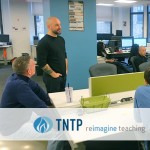Maybe you’ve found your dream company—but it’s located three states over. Maybe you’ve always wanted to move to New York City from your hometown on the West Coast. Or maybe you’re looking for a gig that’ll bring you closer to your family across the country.
In any case, in today’s economy, it’s highly likely that the perfect job opportunity will pop up in another city or state. I know this firsthand from my experience hunting for a job in Texas from California, and then hunting from Texas for a job in California—both of which were strategic steps that allowed me to take the next step in my career.
While searching for my current position, I found that some companies weren’t thrilled, but others didn’t even flinch at offering relocation packages. And four months later, I landed a job and made the official move to Mountain View, California. Here are a few things I learned about navigating the remote job hunt.
Address Relocation Early
Some candidates are shy about telling a recruiter that they aren’t local, for fear that their application will be dismissed immediately. And sure, that may happen—but if that’s the case, it would probably happen at some point anyway!
I received positive responses by addressing my move early in the process—in my cover letter. Natalie, a sales representative who successfully secured positions to move from Oregon to California, agrees. “Concisely explain your desire to relocate in your cover letter,” she recommends. “This addresses concerns with you being an out-of-state applicant and shows the hiring manager or recruiter that you are serious about moving.”
Talk About Roots and Networks
Expect that most recruiters and hiring managers will ask probing questions about your desire to relocate in order to make sure that you actually want to live in their city for the long haul. When they do, it’s great to talk about any roots or network you have in the city—your family, a relationship, an internship you did in college, networks you’re part of. Having some tangible reason to move to a city, other than a job, will show stability and will help put the employers at ease.
Also remember that roots and networks don't have to be physical. Factors like wanting to be close to your industry’s hub (e.g., moving to Silicon Valley to be involved in tech or New York for fashion or investment banking) can confirm your desire to stay in the location for the long haul.
Ask for Intros
This is true in all job-hunting situations, but it’s particularly important when you’re searching remotely. Since it's usually more expensive and uncertain to hire a remote candidate, ask your contacts to introduce you to prospective employers. And try to be open to possibilities that don’t quite seem like the perfect fit but that could help you get your foot in the door. “I've had incredible success interviewing for positions that I've been overqualified for, but that ended up opening doors for me in other locations or at a higher level,” says Natalie.
And don't stop at prospective employers—ask for introductions to your contacts’ friends and colleagues as well. Talk to and meet as many people in your new city as you can, which not only contributes to your roots and networks, it also hopefully sets you up to have people to hang out with once you move.
Be Flexible
There are more logistical challenges when job-hunting remotely, so be prepared to adapt to different interview settings and timelines. Sarah, a consultant who moved from Texas to Virginia, recalls her experience with phone and Skype interviews. “That was my first experience with Skype and, honestly, more nerve-wracking than the actual interviews themselves!”
Her advice for acing the virtual interview? “It was important to find an appropriate backdrop in my home for the interview (I didn't want them seeing my TV or kitchen in the background!). Also, your attire for a Skype interview is equally as important as the attire you would wear to a face-to-face interview. I was surprised to learn after I had been hired about the number of people who did not wear suits or other appropriate outfits during their interview. You've got to go the extra mile to make people want you since you're in more of an ‘out of sight, out of mind’ situation.”
Physical Presence
Honestly, there’s no better way to show you’re serious about moving to a place than by physically being there. Make an effort to spend a week in your new location—or take a few short trips over the course of a couple of months—to schedule interviews, meet contacts, and explore apartments. During my job hunt for a position in Texas, I chose to spend six weeks in the area. I was fortunate to have family to stay with, and the extended stay allowed me to schedule last-minute interviews, attend networking events with local contacts, and show employers my commitment to returning to the area.
Visiting companies in person will also help you get a better feel for the work environments. “The main drawback I found from interviews conducted via Skype is that I didn't have the ability to tour the corporation or interact with anyone other than the individuals I interviewed with,” says Sarah. “Some of the culture of the corporation is lost on a potential applicant when interviews are conducted remotely.”
Once you have your trips planned, reach out to recruiters and hiring managers letting them know that you're in the area and would love to meet them in person.
Finally, if you aren’t having much luck hunting remotely, and you're 100% sure that you want to live in a certain city, it may be worth taking the leap and moving anyway. Once you’re physically there, you can really hit the ground running.
It can be difficult to find a position in another city or state, but the nature of work is changing, and employers realize that their top candidates may not be local. By targeting the right positions and putting in the extra effort, you’ll be packing your bags and settling into a new job in no time!







